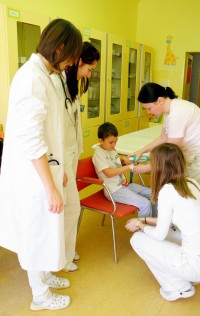The aim of the clerkship is to gain familiarity with the common and important problems that affect children and the psychosocial consequences that arise to themselves and their families. The 8-weeks clerkship for the students with time schedule at the 2nd Department of Pediatrics is tought at the department of clinical pediatrics (toddler section or prescholar and scholar section), as it is posted on the noticeboard.
-
Teaching starts at the Department section at 8.00 a.m.as specified on the schedule. In the case of absence, supplementation of the internship is required, until the date of state exam.
-
As much time as possible should be spent taking an active part in the activities of the host department, clerking and examining all children who are admitted to the wards and assisting the physicians (who will undoubtedly be grateful for the student’s assistance!)

- Students should see the patients whom they have clerked every day. They should write their own follow-up notes in the patient’s chart and, whenever possible, accompany patients in any investigation they might be having (e.g. ECG, chest X-ray, USG, etc.). They will be expected to participate at daily rounds with the attending physician and occasionally will be asked to report clinical findings and laboratory results on their patients.
- During the pediatric clerkship, each student should write a detailed case report on a patient she or he clerked. This should include a carefully taken history (medical/developmental/social), results of thorough physical examination, appropriate laboratory results, detailed discussion and differential diagnosis of the case (simple copying of textbook chapters is strongly discouraged!). Essential points of the report will be orally presented by the student and discussed by his/her fellow colleagues at the credit session.
During the 8 week pediatric clerkship, it is anticipated that the student will consolidate their paediatric knowledge and skills acquired in the pre-clerkship courses.
The primary aim of the teaching program is to stimulate interest in human growth and development, taking a detailed pediatrics history, conducting an appropriate physical examination of children including neonates, make clinical diagnosis, conducting common bedside investigative procedures, interpret common laboratory investigations and plan and institute therapy.
Students qualify for credit by attending the course, demonstrating necessary knowledge and skills in examining patients and presenting case report (a special credit session will be arranged to discuss each case report). Any time missed should be compensated before a designated time limit.
Recommended literature:
- Your notes from lectures and practicals
- Lissauer T, Clayden G. Illustrated Textbook of Pediatrics, Mosby Ltd., 2011 (2007)
- Kovács L.: Pediatria, Arete, Bratislava, 2011, 412 s.
- Šašinka M., Šagát T., Kovács L.: Pediatria I-II, 2. vydanie, Herba, Bratislava, 2006, 1156 s.
- Kovács L., Podracká Ľ.: Pediatria – 1000 otázok a odpovedí. Osveta, Martin, 2005
| Date | Speaker | Topic | Date | Speaker | Topic |
| 1th week | MUDr. T.Dallos | Reumatological disorders | 3rd week | MUDr. T. Dallos | Kawasaki disease |
| MUDr. Z. Pribilincová | Disorders of sexual differentiation. | MUDr. Z. Pribilincová | Congenital adrenal hyperplasia | ||
| MUDr.K. Prochotská | Hypertension | Doc.MUDr.Ľ.Košťálová | Thyroid gland disorders, growth | ||
| Doc. MUDr. Ľ. Košťalová | Hepatomegaly, splemonegaly, Lymfadenopathy , puberty |
MUDr. V. Jankó | Nephrotic syndrome | ||
| Prof. MUDr. L. Kovács | Infant feeding. Vaccination | Prof. MUDr. L. Kovács | Acid base balance, electrolyte disturbances | ||
| 2nd week | Prim. MUDr. R.Riedl | Resuscitation | 4th week | MUDr. Z. Pribilincová | Infusions, transfusions |
| MUDr. I.Šebová | Otitis, Sinusitis | Prof. MUDr. L. Kovács | Glomerular disorders Tubulopathies |
||
| MUDr.L.Pevalová | Sepsis | MUDr. K. Juríčková | Metabolic diseases, hypoglycemia | ||
| Doc.MUDr.I. Brucknerová | Physiological newborn | Doc.MUDr. Ilenčíková | Diseases linked to X chromosome | ||
| Doc.MUDr.I.Brucknerová | Icterus, haemolytic disease | Doc.MUDr. Ilenčíková | Chromosomal anomalies, prenatal genetic diagnosis |